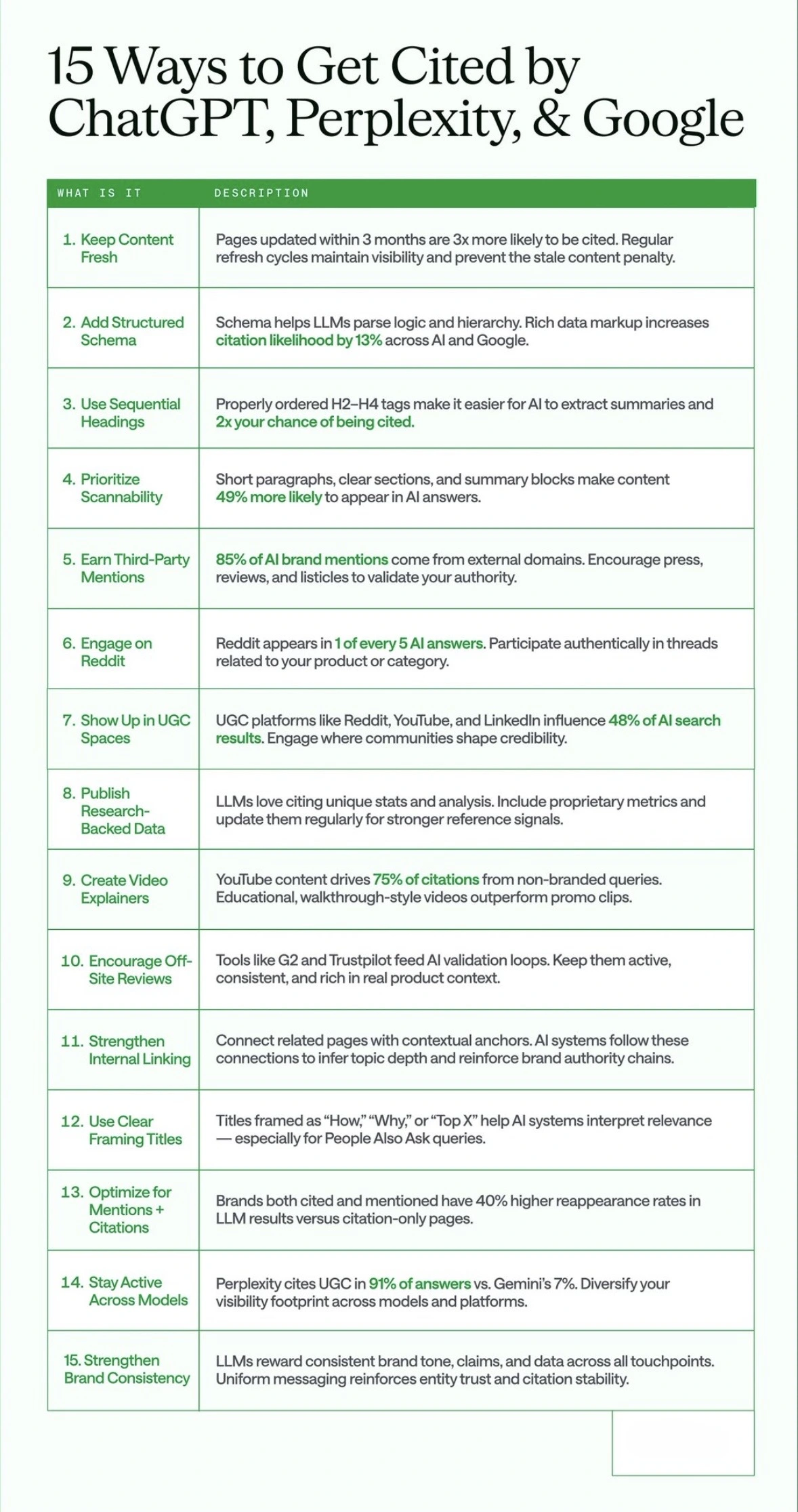AI Search & SEO for Local Business
15 Ways to Get Cited by AI: ChatGPT, Perplexity & Gemini
If you've noticed AI tools answering more of your questions lately, you’re not imagining it. Users now trust ChatGPT, Perplexity and Gemini way more than scrolling through 10 blue links.

Why Some Websites Get Cited by AI - and Others Don’t
AI search has completely changed how people discover information online. Instead of browsing through dozens of links, users now get a neatly packaged answer — and that answer almost always includes a few chosen sources.
But here’s the interesting part: only a tiny fraction of websites ever make it into those citations.
Most never get referenced at all.
The good news? AI models rely on very specific signals to decide who to trust.
So let’s walk through the exact actions that increase your chances of being cited

1. Keep Your Content Fresh
This one’s simple: AI doesn’t want to quote outdated advice.
Pages updated within 90 days are 3× more likely to appear in AI answers.
Why? Because freshness = reliability.
Quick Tip:
Set a recurring reminder every quarter to refresh your top pages.
2. Add Structured Schema
Schema is like giving your content a clean table of contents that AI can follow.
It helps models understand what the page is about — FAQ, How-To, Product, LocalBusiness, etc.
Read more about Google’s official schema guide:
https://developers.google.com/search/docs/appearance/structured-data
Example:
A plumber with LocalBusiness schema + FAQ schema → more chance of being cited when someone asks ChatGPT:
“Who’s a reliable plumber near me?”
3. Use Clear, Sequential Headings
AI reads your content top-to-bottom like a skimmer.
H1 → H2 → H3.
Clean structure can double your citation likelihood.
Example:
“Drain Cleaning Services – Austin, TX”
H1: Drain Cleaning Services in Austin, TX
H2: What We Fix
H3: Clogged Kitchen Sinks
4. Make Your Content Scannable
Short paragraphs, bullets, and summary boxes make AI’s life easier - and humans too.
Scannable content is 49% more likely to appear inside AI answers.
Try this:
Add a 3-line summary box after every major section.
5. Earn Third-Party Mentions
AI trusts “the internet talking about you” more than “you talking about you.”
Roughly 85% of AI brand mentions come from external sources.
Where to get them:
• Local chamber of commerce
• Niche industry blogs
• Listicles
• Review sites
• PR write-ups
• Guest posts on reputable platforms
Example:
Harvard Business Review articles get cited constantly because they are independent, high-authority insights.
6. Participate on Reddit
Reddit shows up in 1 out of 5 AI answers.
It’s a huge credibility signal.
Tip:
Don’t promote yourself.
Just join conversations and help people.
Example:
A local HVAC company answering real Reddit questions in r/HomeImprovement creates a trail of expertise AI loves.
7. Show Up in UGC Spaces
UGC (user-generated content) influences 48% of AI search results.
These platforms create “proof” that you know your topic:
• Reddit
• LinkedIn posts
• Quora answers
• YouTube comments
• Community Q&As
Example:
A lawyer who consistently answers on Avvo and Quora becomes more visible to AI systems scanning legal advice.
8. Publish Research or Unique Data
AI loves data.
Especially original data.
Even tiny data sets help.
Examples you can publish:
• “Average AC repair cost based on 117 service calls.”
• “Top 10 reasons roofing jobs fail (backed by 52 inspections).”
Models will quote this because it’s yours — not generic.
9. Create Simple Video Explainers
YouTube accounts for 75% of citations from non-branded queries.
AI models treat YouTube as an educational library.
Most people look up how-to videos or quick explanations, and AI tools pull a lot of their information from there.
Example:
“How to Tell If Your Roof Actually Needs Replacement”
“Peeling Paint? Here’s the Real Cause and How to Fix It”
“Before You Choose a Contractor, Watch This”
10. Encourage Off-Site Reviews
Reviews build trust loops for AI systems.
Tools like:
• G2
• Trustpilot
• BBB
• Yelp
AI reads these platforms to confirm legitimacy.
Example:
A business with 150 real reviews across 4 platforms looks far more credible to an AI than one with 5 reviews only on Google.
11. Strengthen Internal Linking
AI uses internal links to understand your topical depth.
If you write about your noche across 20 articles but nothing links together, AI sees those pages as isolated.
Tip:
Always link:
• up (to pillar pages)
• sideways (to supporting pages)
• down (to deeper posts)
Google’s official guide on internal linking:
https://developers.google.com/search/docs/crawling-indexing/site-structure
If you want to see how strong internal linking and topical depth translate into real-world results, here’s a case study on how we ranked a local business in Google Maps in just 14 days
12. Use Clear, “Framing” Titles
AI loves clarity.
Titles like:
• “How to…”
• “Why…”
• “Top 10…”
map directly to question-style search.
Example:
If someone asks ChatGPT:
“How do I upload insurance documents to Google Business Profile?”
Your article titled exactly like that becomes a strong candidate for citation.
13. Optimize for Mentions AND Citations
AI looks at two things:
• Who gets talked about
• Who gets linked to
Brands that show up in both contexts have 40% higher reappearance odds.
Practical tip:
Keep building both:
– YouTube mentions
– PR mentions
– Guest posts
– External backlinks
– High-quality on-site content
14. Stay Active Across Models
Each AI model has its own “input diet.”
Perplexity cites UGC in 91% of answers.
Gemini does so in only 7%.
So if your content only lives on your blog, you miss visibility in half the space.
Be everywhere AI looks.
15. Keep Brand Consistency Everywhere
AI cross-checks your identity across:
• website
• LinkedIn
• Google Business Profile
• reviews
• citations
• social posts
If your messaging keeps changing, AI gets unsure whether the information matches one entity.
Consistency = trust.
Final Word
AI citations aren’t about gaming the system.
They’re about showing up consistently where the internet gathers context, trust, and proof.
If you think about it this way:
Google shaped SEO for 20 years.
AI will shape the next 20



.png)
